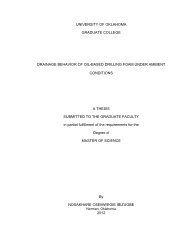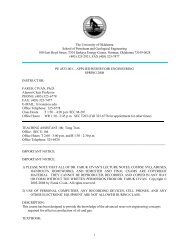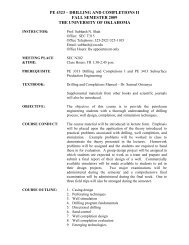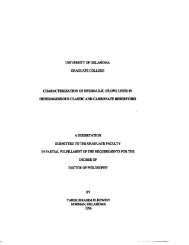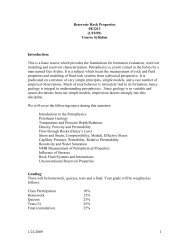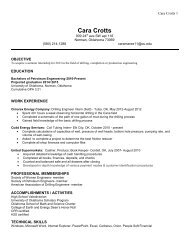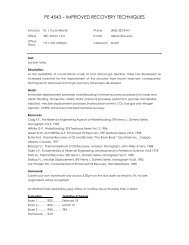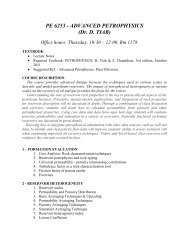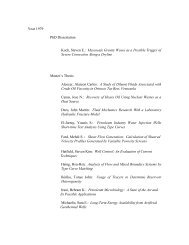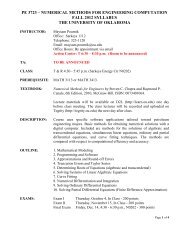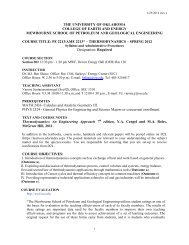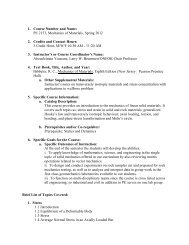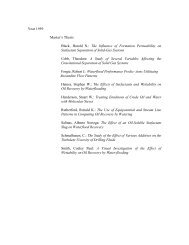Winter 99/00 - Petroleum Engineering | The University of Oklahoma
Winter 99/00 - Petroleum Engineering | The University of Oklahoma
Winter 99/00 - Petroleum Engineering | The University of Oklahoma
Create successful ePaper yourself
Turn your PDF publications into a flip-book with our unique Google optimized e-Paper software.
OU Discovery<br />
School <strong>of</strong> <strong>Petroleum</strong> and Geological <strong>Engineering</strong><br />
our pr<strong>of</strong>essional development in a very<br />
paternalistic fashion. That viewpoint<br />
does not work any more. We have to<br />
take charge <strong>of</strong> our own continuing<br />
education. We, as individuals, must be<br />
proactive in ensuring that we remain<br />
technically current if we want to stay<br />
competitive and provide added value<br />
to our employer, which is what we are<br />
paid for.<br />
This is where the interconnective<br />
“umbilical cord” comes in. Our<br />
universities can help us remain up to<br />
date; they must also be effective in<br />
providing the right pr<strong>of</strong>essional for our<br />
industry. Industry, <strong>of</strong> course, will<br />
provide the specific training that may<br />
be required for a certain job. SPE can<br />
help members move in this direction<br />
and provide them with the international<br />
perspective that is so important<br />
in today’s world <strong>of</strong> globalized economies<br />
and industries.<br />
To put this in perspective, I refer to<br />
an article that circulated in the mid-<br />
1960s. <strong>The</strong> article, written by George A.<br />
Hawkins, who was dean <strong>of</strong> <strong>Engineering</strong><br />
at Purdue <strong>University</strong> at the time,<br />
appeared in Engineer magazine (1966-<br />
67, Volume 7, No. 4). <strong>The</strong> article called<br />
this obsolescence process “the four ages<br />
<strong>of</strong> an engineer.” Hawkins’ point was<br />
that it is a costly mistake not to recognize<br />
that maintaining our technical<br />
knowledge is a lifelong process and<br />
that the solution requires a great deal <strong>of</strong><br />
self-discipline.<br />
Our complaints about our knowledge<br />
requirements and the fault with<br />
university education can be divided<br />
into four periods after graduation.<br />
According to Hawkins, after between<br />
one and five years after graduation, the<br />
engineer would like to have had more<br />
practical courses. <strong>The</strong> young engineer<br />
becomes impatient because he or she<br />
cannot solve the practical problems<br />
that the experienced engineer can<br />
solve. After five to 12 years, engineers<br />
wish for greater competence in the<br />
basic sciences - math, physics, chemistry<br />
- because they lack the knowledge<br />
to solve difficult engineering problems.<br />
<strong>The</strong> engineer begins to show a lack <strong>of</strong><br />
newer scientific and theoretical<br />
knowledge.<br />
After 12 to 25 years, engineers require<br />
more administrative and managerial<br />
knowledge - speech and report writing,<br />
industrial relations, finance. <strong>The</strong><br />
mature engineer realizes that she or he<br />
needs not only the technical knowhow<br />
but also supervisory, administrative<br />
and managerial skills. After 25<br />
years, the engineer becomes more<br />
philosophical and may desire to know<br />
more about the arts, music, literature,<br />
and drama. As they approach retirement,<br />
some may admit to a total lack <strong>of</strong><br />
cultural activities.<br />
Hawkins quite rightly identifies<br />
these four stages. Each requires<br />
specialized knowledge and skills.<br />
Certainly, no engineering program can<br />
prepare its graduates for the next 40 or<br />
50 years <strong>of</strong> pr<strong>of</strong>essional life. Hawkins<br />
believes that it is totally inappropriate<br />
to talk <strong>of</strong> not being technically competent<br />
some 10 years after graduation,<br />
when the process really starts the<br />
moment we graduate.<br />
Hawkins’ article was written more<br />
than 30 years ago. <strong>The</strong> rapidity with<br />
which technology is now being<br />
developed, and changing our ways <strong>of</strong><br />
thinking and working, reduces those<br />
first 10 years substantially. We can<br />
become obsolete a lot more quickly<br />
now. My message to younger engineers<br />
Inciarte with <strong>University</strong> <strong>of</strong> <strong>Oklahoma</strong> President David Boren and other<br />
<strong>University</strong> dignitaries at the signing ceremony <strong>of</strong> the Charter for the Energy<br />
Institute <strong>of</strong> the Americas on May 12, 1<strong>99</strong>5 in President Boren’s <strong>of</strong>fice.<br />
is to let your pr<strong>of</strong>essional society, your<br />
company, and your university help you<br />
defeat the obsolescence process. Keep<br />
yourself up to date not only technically<br />
but also in your total pr<strong>of</strong>essional and<br />
life development. Remember, it is not<br />
one instead <strong>of</strong> another, but a different<br />
emphasis at different stages <strong>of</strong> your life.<br />
continued on page 6<br />
5



